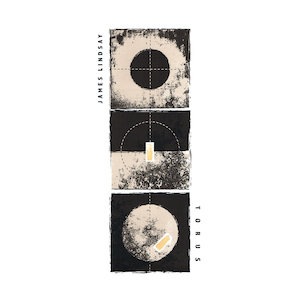
James Lindsay – Torus
Independent – Out Now
Already well-known as the double bass player in Breabach, James Lindsay has steadily been building a parallel career both as Glasgow’s go-to bass player, appearing on recordings for a host of other artists, and also as a prize-winning composer. The composer in him led to the release of Torus, his second solo album following on from 2017’s Strand.
With Torus, James continues exploring the music that arises from melding traditional folk with contemporary jazz. For the recording, he’s recruited a team of eight musicians, some names familiar in the folk world, some in jazz. On the folk side are Rura’s fiddler, Jack Smedley and Angus Lyon who, when wearing his Blazin’ Fiddles hat, is usually found on the piano but here plays the accordion. Finally, Skye’s traditional Gaelic singer, Deirdre Graham, handles the song that forms part of one track. From the jazz world come electric guitarist Ben MacDonald, saxophonist Norman Wilmore and drummer Scott Mackay. James himself has his feet firmly placed in both camps, contributing bass guitar along with electric guitar, Moog and other synthesisers. Also featured is John Lowrie, an artist that is also well known for bridging folk and jazz. I quoted John’s self-description recently when reviewing the album Staran, and it certainly bears repeating, “equally at home playing intricate contemporary jazz on the drums as accompanying Gaelic song on the piano”. However, on Torus, whilst most definitely contributing contemporary jazz, it’s on keyboards rather than drums. Finally, the percussive skills of Signy Jakobsdottir continually straddle any number of genres but sit very comfortably within Torus.
During the two years he composed Torus, James mused on man’s connections to the natural world, highlighting the tensions between things ancient and modern, places wild and urban. The album’s title references the cyclic interactions with nature that have always been a part of human existence. The tracklisting on the album sleeve pairs the title of each piece with a sentence or two. These make connections to a memory, a scientific snippet, a tradition, whatever was running through James’ mind providing inspiration as he worked on the piece.
The first track, Lateral Roots, opens with various instruments, both traditional and electronic, contributing brief phrases, layering them up until the accordion imposes a melody. As the track develops, first electric guitar and then alto sax takes over with solos that sound improvised, but maybe James scored them; it is his album after all. The track leaves behind an impression of strands of intertwining sound while the following track, Observatory, is very much in contrast. With its inspiration being the night sky, it’s no surprise that it initially feels quite ethereal with swirling waves of sound. Once drums fix it to a rhythm, it develops into a piece dominated by a fiddle melody that could almost be traditional, backed by drums, guitars and James’ adventurous synthesisers. And, to top it all, there’s an outstanding passage on bass from him.
At the heart of the album lies a piece that takes inspiration from the collection of truly ancient gneisses that form much of North West Scotland, both mainland and the Hebrides. With its oldest components formed as much as three billion years ago, any contemplation of the rocks of the Lewisian Complex prompts thoughts of deep time and how features in the natural world can keep a record of events that far surpass human memory. James’ composition takes Lewisian Complex as its title and, at a little over ten minutes, is given a musical version of deep time to develop its own levels of complexity. Passages with strong traditional elements evoke the sound of the pipes merging into electric guitar solos that push us into the realm of experimental rock. In the midst of this mêlée, a sax solo becomes a stabilising influence, making space for Deidre’s calming voice singing a passage of Gaelic poetry, Clach-stèidh, written by Ewen Henderson.
An album aiming to bring together such a range of musicians and then guiding both musicians and instruments away from their usual sound demands the very best production and recording talent. Using Glasgow’s GloWorm Studios and enlisting Euan Burton to share production with him and look after recording and mixing, James has ensured that the final product succeeds on all these levels.
James summarises his thoughts on our cyclic connections with nature in a sentence on the album sleeve, “Torus is an exploration of the flows which connect us to our world, and a reminder that change is our only constant”. Musically, this has translated into nine pieces that continually challenge our preconceptions of music made using traditional instruments. At the same time, it’s music that allows the sounds of electric and electronic instruments to sometimes blend with, sometimes mask the acoustic instruments while always enriching the whole. It’s music that is never content to stay in the background, demanding your attention as it steadily coaxes you deeper into its playful sonic games, ultimately repaying your rapt attention.
Torus is out now. Order via Bandcamp: https://jameslindsaymusic.bandcamp.com/
Photo Credit: Elly Lucas
